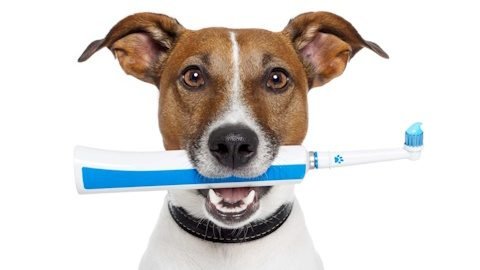
Regular brushing is essential for your pup. Not just for the sake of fresh breath, but for your dog’s overall health as well. Certain dental problems, such as toothaches and sore gums, can eventually lead to life-threatening infections if not taken care of, so you should take them seriously.
It’s Best to Start With Tooth Brushing at an Early Age
There are some differences between small and large dogs when it comes to the oral cavity. For instance, small dogs tend to have more issues with tartar, plaque, and calculus buildup. In addition to these, large breeds are also more likely to experience injuries such as fractured tooth tips. Bacteria accumulated along your pooch’s gums can lead to periodontal disease or even reach the bloodstream.
Whatever breed you have, your pup’s oral hygiene is crucial for keeping your pet away from more alarming health issues. So, be it a small or a large one, it’s best that your dog starts getting used to the toothbrush as early as possible. Not many dogs enjoy it when you brush their teeth, but they are less likely to refuse it if you start while they’re still puppies.
Use an Enzymatic Toothpaste and Coconut Oil
Choosing the right toothpaste is of paramount importance. Therefore, you should think way beyond just fresh breath. In addition to scrubbing ingredients that wash away stains and plaque, your preferred toothpaste should also contain enzyme-reducing bacteria. You should never use human toothpaste because it can be toxic to your canine friend if he or she happens to swallow it. In addition, organic coconut oil has antiseptic and antibacterial properties, which are good for your dog.
Use Tooth Wipes If Your Pet Doesn’t Like Toothpaste
Dental wipes for canines are similar to those for toddlers—soft and uniquely textured to gently clean teeth and gums. They are suitable for all breeds and come in various flavors so that your pup gets used to them more easily. If your furry friend refuses a toothpaste and toothbrush, these wipes can be a great way to slowly introduce an oral hygiene routine, one step at a time.
Frequently Give Dental Treats to Your Pet
If there’s one thing that all dogs have in common, then that is, without a doubt, their love for treats. Here’s some good news: treats do more than bring pleasure to your furry friend. They are considered to be a rather strong tool for keeping your puppy’s mouth clean. Dental treats are made to remove plaque buildup as well as to freshen breath due to some special ingredients. The very act of chewing these treats helps remove food particles and calculus from the surface. In addition to that, the treats are also good for massaging the gums.
Depending on your pup’s likes and preferences, you can choose from a variety of shapes, sizes, and flavors, but only buy brands with high-quality natural ingredients.
Know What Food Improves Dental Health in Dogs
When it comes to snacks, you need to be careful about what you feed your pooch, as this choice can affect his or her health. To start with, remember that dry food is better than soft food. The explanation is quite simple: soft food is more likely to stick to the teeth and then lead to decay. Feeding your canine friend dry food is, thus, even more important if your pet refuses regular tooth brushing. And again, only buy dog food containing high-quality natural ingredients.
According to many veterinarians, raw meaty bones and other raw foods help resist bacterial plaque, which makes them good for your pet’s health. Some studies have shown that chronic oxidative stress is linked with chronic periodontitis, which means antioxidants also play a vital role in your pup’s diet. It would be a good idea to include fatty acids and probiotics, too. In addition to being good for periodontal tissues, fatty acids are also crucial for the heart, kidneys, and brain, while probiotics are necessary for the entire gastrointestinal tract.
The Benefits of Dog Chew Toys
Giving your pup chew toys is another great way to improve oral health and strengthen gums. Many veterinarians recommend using chew toys, but only in addition to tooth brushing. The very act of gnawing scrapes the plaque and tartar, which, combined with regular tooth brushing, is bound to keep your dog’s chompers and gums in good condition.
While chew toys are generally considered beneficial, make sure there are no harmful ingredients before giving them to your pooch, and stay away from chew toys that are too hard. If the toy is too hard, gnawing on it can lead to a tooth fracture or other injuries. You should check to be sure your chosen toy is not too hard by banging it on your knee; if it hurts you, it means it’s too hard.
Get Professional Teeth Cleaning at the Vet Twice Yearly
No matter how often you brush your dog’s teeth, you still need to have them professionally cleaned every six months. Your faithful companion deserves only the best, right?
You should also look for signs telling you that something may be wrong and take your faithful friend to a vet for a check-up. As a responsible pet owner, you should check for these signs regularly:
- Bad breath
- Excessive drooling
- Red, swollen, or bleeding gums
- Discolored or crooked teeth
- Any change in eating or chewing habits
Should you notice any of these symptoms of dental disease, take your pup to a vet immediately. Waiting for any of these issues to just go away is never the solution.
Luxury Pet Grooming offers non-anesthesia teeth brushing using a tasty, enzymatic toothpaste and coconut oil in The Royal Canine Signature Service and The Pampered Pooch Deluxe Service. It is also available as an a la carte service. For brushing your dog’s teeth at home, we recommend the Mira-Pet ultrasonic toothbrush, which is available in our Boutique.



